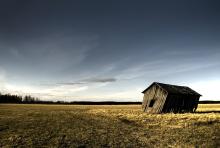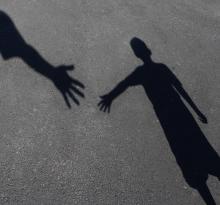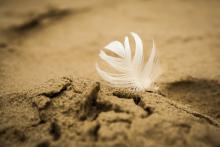Poetry
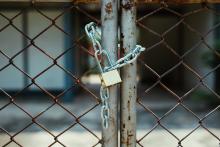
I see you but you do not see me
I am made invisible by your special powers
Not mine. I have no power.
Your shiny car passes me
It does not have a speck of dirt
But I am filthy
Only my sweat shines at the bus stop
As it did today in the fields
I smell like dirt
I know you are not hungry
Because I see you in your red car
Driving to a fancy restaurant
You do not know I am hungry
Because you cannot see me
I had no lunch today
My belly hurts
But you cannot hear my emptiness
You only hear the music in your car
I see you but you do not see me
Perhaps all of me was left
In the woods where I slept last night
Or maybe the mosquitoes sucked my life away
One by one as they found me on the ground
Because I had no blanket to cover me So I itch. They saw me though you do not.
I dream of home. My mother and my sisters
Hungry, waiting for the money I will send for food.
“America ... you will make lots of money
Our stomachs will be full
And your sisters will have shoes”
I hope my boss pays me this week
I look at my boots
These boots took me 15 days through the desert
Now they will bring me through the fields
And I wonder ...
Is it the car that makes me invisible
Because I see you but
You do not see me

You shall love the Lord your God with
all your heart, and with all your soul,
and with all your strength, and with
all your mind; and your neighbor
as yourself. —Luke 10:27
such is the lawyer.
we need to know.
road less traveled.
not robert frost.
in that space.
like a typewriter
on table, sewing
machine sitting still
this is why i do this
work. not the walking
dead. not some george
romero extra. like the
young troubled girl in
my neighborhood just
last week. no one reached
out. they called the police.
locked their doors, windows.
they became priest, levite
on the other side of the
road. it was like when
i was 13 standing on the
high dive. gravity take
over. send me to water
below. don’t be everyone.
ask of myself each second:
will i cross the road? “it is
written in the law.” heart
& soul. love. neighbor.
even if they aren’t nice. another
chance to hear that answer.

Light dimming now the two friends hurry
to lower the body. Joseph’s thumb bleeds,
stuck by thorns when he cradled the head
while servants wrapped limbs in carry sling.
Nicodemus staggers beneath a hundred
pounds of spice-packed jars on his back,
no heavier, he thinks, than the fear which
held him burdened for so long.
In silence they leave
the carrion crowd, wind along stone garden paths,
weave past carved caves. The grave they had readied
for themselves in death, the two now give
the Galilean—though they know now
it was life he had bestowed when first they met
in dark of night, in temple yard.
In silence they perform
the ancient rituals. Wash the body,
anoint with aloe, wind the myrrh-filled cloth
encircling feet, legs, arms, hands,
strips of linen woven under the scarred
small of his back, stretched across his yielding
torso, layer upon layer of burial resin
mixed with aloe filling
the stone chamber with the scent of death.
Light dimming now the two friends hurry
to shroud the head, cover the beloved’s face.
Their hearts say linger but day is gone
so they pull the stone in place, rush to wash
for Sabbath prayers.
In silence the garden sighs.
Plants furl in the dark. The rising wind keens
the song a thousand spices cannot mask,
the dark a tombed heart
too heavy for even night to bear.
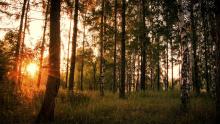
There are days when I think about going to live with the monks.
My brother Richard did this in the early sixties. He never discussed
the idea with me. A day simply came and my family took him to the
LaGuardia Airport. We said goodbye and then he was gone.
I wonder how many men leave a home each year because of a
spiritual need to either be alone or closer to someone other than a
human being. Richard went away to upstate New York. Growing up
in the South Bronx I never thought about upstate. How many slaves
went to sleep every night tired of picking cotton but never dreaming
of Canada?
Lately I listen to people in cafes or pundits on television talking about
the recent presidential election. I guess this is how our nation felt
after Lincoln’s death. What will become of our Union now? Alas, I look
into the mirror and see a wretched freeman.
There is a way a tree will talk to a black man, how it might guide him
out of the woods and toward freedom. Outside my window I look at the
trees, I notice their naked limbs, their leaves gone from too much
weeping. I feel like a lover who wakes before daybreak only to discover
love is gone.
I feel a longing, a need for prayer and fasting. Where is the choir for
my soul to join? We are a people in need of song—it’s time to compose
new spirituals. We either dream or die.

I saw her in the month of mumps
puffed up in poverty’s robes,
a woman of fragments,
a shuffling quilt with running threads—
more holes, really, than skein.
You could read history in the headlines
she wore, partial untruths, incomplete
fictions. All of her lovers
failed to match the shoes she put on.
Every child she birthed missed having
national sunshine and two names.
She dodged taxes on her home;
it never had an address to speak of and
moved like wind-spinning, clanking aluminum cans
she chased for pennies.
Her boudoir looked like a butcher’s sleeve;
stolen ketchup packets from McDonald’s
provided ambergris for her perfume.
She was disqualified for any entitlements
except for open dumpsters on eyeless streets.
But mail always waited for her
no postage due; she was the patron
of the discarded; on winter nights the USPS
coated her from the leprous jaws of the wind.
She slept at the homes of three different zip codes
one January; always leaving at dawn’s early light;
she thought the flag needed to be washed.
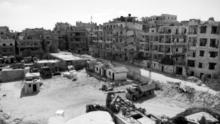
Watching the evening news
He stumbles along in broken gait, pale face frozen
in a blank stare, and all the long, long river of moving
bodies pass him by. Even the frail move faster,
framing him against their blur of anguish, like a film
that runs slow motion, etching one small
centerpiece against the screen of the unwilling eye.
Upon his back—as if coupled there, ribs fused to ribs—
rides an ancient man, more skeletal than fleshed,
skull rocking gently, rhythmically, arms crooked
absurdly over the hard-set slope of shoulders, hands
snatching at the brittle air. Thin-stick shanks
dangle loosely over the young man’s arms, bobbing
with the plunge and stagger of his legs—like
metronomes that pace the broken angle of each step.
And still they come, he comes—this strange, two-
headed creature all its own, with its four unseeing eyes,
its single haunted soul. Like a crab caught in an
unremitting tide—an awful metamorphosis, a horror
that we cannot look upon, nor speak of, nor forget.
Still he comes, inseparable, inexorable. The dying and
the young—a ghost that rides the shoulders of the world.

As I walked through the wilderness of this world, I lighted on a certain place where
was a den, and laid me down in that place to sleep; and as I slept, I dreamed a dream.
—The Pilgrim’s Progress
I stand at the edge of these sharded cliffs
Time and the sea have splintered away
From this rotten stump of island,
Fit only for felons and the likes of me.
The glorious ocean spreads out of sight,
Moving, moving, with no signs of life.
But, beneath the calm I know there lies
An empire old as the birth of time,
A kingdom swollen with citizenry:
Jellyfish, groupers, turtles, rays,
Serpents splitting the currents like grass,
Sharks and the fearsome leviathan.
Freedom? You can’t get there from here.
But from where I stand I could leap out,
Crash through blue mist coiling the shore,
Mesh with the pebbles that constitute
The thread of beach strung out below,
And wait for Jesus to remember me.
On the other hand, I could just crawl
Back into my cave, do my best to ignore
The lost years charcoaled on the walls
And the stench of human occupation,
Lie down, stretch out, fold my hands
Behind my head, and close my eyes,
My last thoughts being, before sleep:
If the deep blue holds such mystery,
What must the secrets of heaven be?
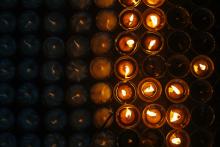
Lighting these candles—porous and buoyant—
Grounds us
Flames draw our eyes to heavens dotted white
With celestial thought
To look back in time through the stars
Hundreds of light-years away
To glimpse God standing
On the shore of God’s self
With outrageous visions and promises
Of hope that strain our belief
What can we do with such promises?
With tradition that grounds us in hope
In stars in candles in souls set alight?

Here, nobody stands
for the national anthem.
There’s no debate about
universal healthcare,
no talk of bigger border
walls or who will pay.
Here no one snapchats,
sends selfies or sexts. Google
steals no one’s idle hours.
No political parties here,
no signs to say white
lives matter too: everyone
gets it here. There’s no
NRA, no second amendment,
no bumper-sticker zealots
declaring “if you can read
this you’re in range.”
No,
here at the Pilgrim Home,
just across from the summer
play of a city pool, it’s all
cut-granite reverence
for beloved son, daughter,
dearest husband, moeder,
madre. On this level
expanse no fences
separate black and white,
they enclose. In this green
space the Mexican lies down
with the Dutch, and under
fresh rectangles the refugee
rests with the rich.
Here,
old, sleepy spruces cast
long layers of shadow
among the graves. Lilies
and orchids and roses revere
each silent name and date
and the brief dash between—
briefer than an evening walk,
than a child’s splash.

Wedged in the crevices
of each day
there is terror
and everywhere
fresh pieces of communion
go uneaten.
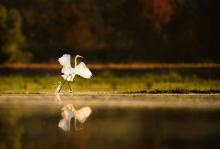
Unsure of my crossing, I stand and wait at the Jabbok
In a wrestling rhyme of rapids. The waters from the river
Rise around my fears and blur my eyes. I am uncertain
Where my footfall will land. My sandal slides turning on rocks.
I watch others cross ahead of me with obedience,
While I drop back to the crisis I find lurking
In the shadows of my soul. A drought-coward spirit
Dries up the will and burns through my identity
Destroying the brittle nature of my grip on this land
That waits on the other side of the river.
I am stalking through the darkness of my soul
For the person waiting beyond my dreams. The twin
Shadow of a birthright slips through my memory.
My father’s blessing evaporates in my mother’s maneuvers of facts.
My brain is a soup of deception: my mind is a sheep blind
Without a shepherd to open the gate. Unvoiced by silence,
I wait, unable to cross, paralyzed and unprepared without a prayer.
The void of doubt drifts into night where demons perch
In my dreams foaming at the ford of the river in my head.

“Has the United States ever apologized?
Or are we too big to apologize?”
—Warrant Officer Hugh Thompson
The Chaplains Handbook has no confiteor or rite,
neither Book of Common Prayer nor missalette,
for scrutinies that beg forgiveness from the torn
and desecrated dead. We come contrite
for reports of helicopter gunships,
bodies observed in a ditch, the undress
of a girl who covered only her eyes:
Noncombatant gang rape, with bayonet.

How to bring god closer
after the frenzy, the snarling riots,
this god hanging on a tree?
Do I stand here, as the story goes,
looking, do nothing, imagine
pouring myself toward him,
a flame across a field?
Or would I go there,
climb up, pry the first nails out
with the claw of a hammer,
wrap my arm tightly around his waist,
like my son I rescue from a branch too high?
I struggle to keep his weight on my hip,
his arm over my shoulder
while I wrest the other nails loose.
Smelling his sweat and tears,
I hoist him, lower him to the ground,
and then, with a wet cloth,
wash blood and dirt from his face,
tell him it will be all right now.

Enter this room and call it a cell.
Fold yourself and put yourself away.
For your whole life, you will be an amateur.
But be an amateur striving.
Enter this room and call it vigilance.
Make your ego the threadbare rug you walk on.
Before your quiet face, hold
the fane of your folded hands.
Fold yourself and put yourself away.
Become the parent to your parents.
Cast their names on the wind of your breathing.
Enter this room and be alone with dialogue.
Take the name of silence and let it speak.
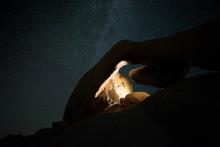
In the beginning was the end
and in the end, silence
and the silence is God.

A way of binding books that will prevent
breaking of backs.

